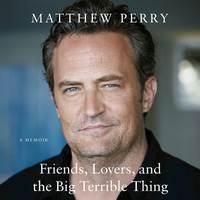 Friends, Lovers, and the
Friends, Lovers, and the
Big Terrible Thing:
A Memoir
DETAILS: Publisher: Macmillan Audio Publication Date: October 31, 2022 Format: Unabridged Audiobook Length: 8 hrs., 49 min. Read Date: December 6-7, 2023

My mind is out to kill me, and I know it. I am constantly filled with a lurking loneliness, a yearning, clinging to the notion that something outside of me will fix me. But I had had all that the outside had to offer!
What’s Friends, Lovers, and the Big Terrible Thing About?
This isn’t full of—but does contain—some good, behind-the-scenes stuff about Friends, Fools Rush In, The Whole Nine Yards, Mr. Sunshine, The Odd Couple, Studio 60 on the Sunset Strip, and other projects. But those don’t make up the bulk of the material. And those are interesting, amusing, and support the overall thesis of the book—he’s an addict who has been blessed with more good things than he knows how to handle.
There’s some juicy (largely nameless, but you can read between the lines) bits about his love life—as the title suggests. But again, there’s not much of that overall—and those, too, serve to support the overall thesis—even more than the professional matters do.
Then there’s the Big Terrible Thing—his addictions themselves, how he got started, how he maintained them, and his several attempts to get sober (of varying successes and lengths of success). He also goes into graphic (perhaps too graphic) detail about the physical toll they’ve taken on him—and the financial, emotional, and mental toll they’ve taken on those close to him.
How Perry Comes Across
When this book first came out (or just before it) there were more than a few headlines about some (I’m going to be charitable and call them) questionable jokes he made about Keanu Reeves and some people casting doubt about some of the particulars of some of his stories. Given how impaired he was during most of those disputed events (and just about every other event he recounts), I’m not surprised he doesn’t remember them correctly, and I don’t think it should be held against him. The Reeves jokes, on the other hand, might have seemed like a good idea at the time—but his editors really should’ve stopped them. I jotted down a note after the second one that “someone at Macmillan must have it out for him to let this make it to print.”
But both of those things pale in comparison to everything that Perry admits to in this book. He doesn’t come across as a good guy at all—and I don’t think he’s trying to. Sure, the fact that he’s (seemingly) coming clean about everything and (seemingly) taking responsibility for the lies, destructive behaviors, and despicable actions might make some people want to think better of him—but I don’t think he really wants that.
He comes across—and I realize this could be entirely calculated—as someone who is being honest about his shortcomings, seeking to explain the devastation his addictions have wrought on himself and many, many of those around him—how he’s somehow managed to have some success in the midst of that. He gives credit to some of those who’ve helped him get to this point in recovery—or kept him alive long enough to get there. In the end, however, Perry’s not a good guy and doesn’t pretend to be one. He’s a mess who will very likely kill himself if he relapses a time or two more.
So, what did I think about Friends, Lovers, and the Big Terrible Thing?
I’ve been a big fan of Perry’s since Friends (I can point to the joke that made me one)—I’ve seen almost everything he’s done (sometimes not because of him, but I appreciated his involvement). But I put this book under the category of “will get around to eventually, maybe.” Until I saw people reacting to how much of the focus of the book is on the Big Terrible Thing. And that piqued my interest.
That sounds ghoulish, I realize, but hearing a well-documented addict talking about their struggles is something that I appreciate. It helps me empathize with those I know fighting that fight, and I hope, helps me understand and appreciate their struggles.
Perry’s clear that he’s been given every opportunity, tool, and help to get sober and to maintain that sobriety. And he’s squandered almost every one of them. And it has yet to work. The amounts he takes on a regular basis when he uses is…it’s a shocking amount—and only someone as wealthy as he is could pull it off.
At the same time, there’s a glimmer of hope. A faint glimmer, sure. But there is one—and if someone whose rock bottom is as low as Perry’s was can maybe make it—there’s hope for others, too. And that’s the big thing I took away—there’s hope. Hope for other addicts, hope for Perry.
I thought this was a riveting and disturbing read—made tolerable by Perry’s off-kilter and somewhat humorous telling of the stories. It’s not like most celebrity memoirs I’ve read (but I don’t think it’s that ground-breaking)—but definitely worth the time.

This post contains an affiliate link. If you purchase from it, I will get a small commission at no additional cost to you. As always, the opinions expressed are my own.
![]()



Bob Germaux
I’ve been wondering if I should try Perry’s memoir, H.C. Sometimes celebrity memoirs are not so good, but sometimes they’re great. (Bob Newhart’s “I Shouldn’t Even Be Doing This” and Penny Marshall’s “My Mother Was Nuts” were both wonderful and hilarious.) Based on your very thought-provoking review of Perry’s effort, I’ve downloaded a sample of it. I know what to expect, and I’m looking forward to eventually reading it. Thanks for the heads-up about the book and about what type of book it is.
HCNewton
I just put a reserve on the Newhart book at the library–don’t know how I missed that he wrote one. Looking forward to diving into that.